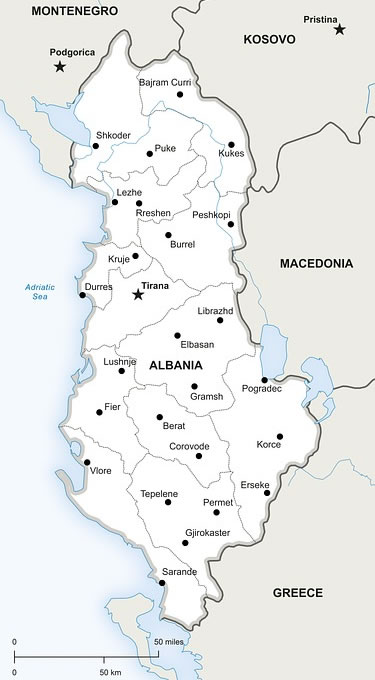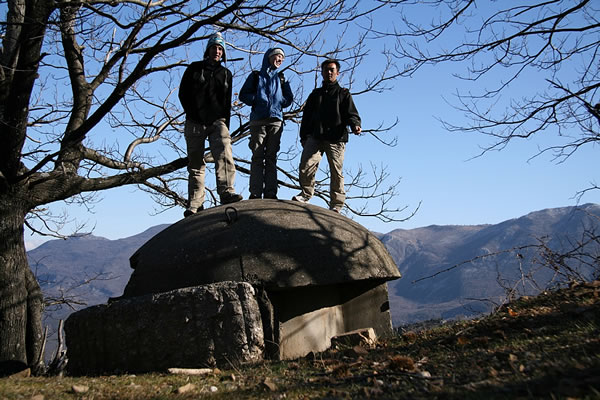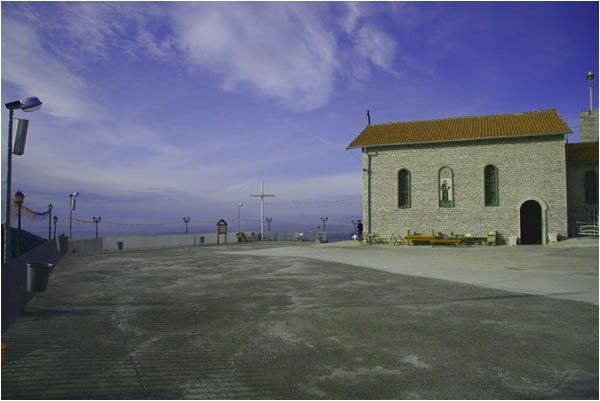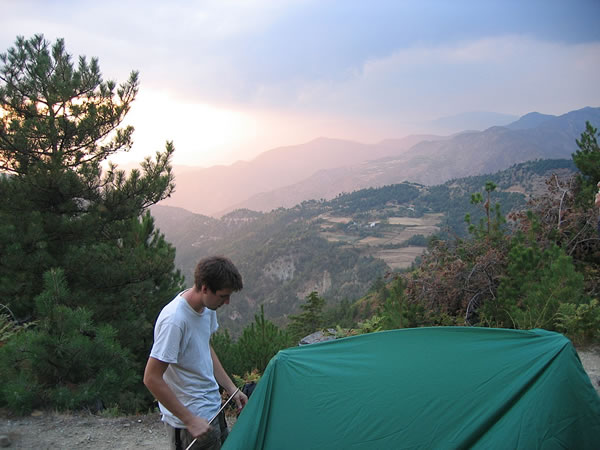Living Abroad in Albania
The Land of a "Hundred Thousand Welcomes"
Article and all photos by Katie Mastin
Published 11/14/2019
 |
| Albania is a lesser-known nation of 8 million on the Adriatic Sea. |
Most countries have an official slogan for tourism. Canada, keep exploring. Kazakhstan, the land of wonders. Namibia, endless horizons. New Zealand, 100% pure. Albania’s former slogan is slightly comical but more honest than most — Albania, unusual but rewarding.
Unusual but rewarding is the perfect description of life in Albania. The Balkan nation is roughly the size of Maryland, sandwiched between Greece, Montenegro, and the Adriatic Sea. There are more Albanians living outside the country than in the homeland, and during the summer months when the emigrants return, the population of the small town my husband and I called home for two years more than doubled. There are few books written about Albania, and movies featuring Albanians usually depict them as hardened mobsters. Yet despite its ‘unusual’ reputation, Albania has a breathtaking coastline, some of the most striking mountains in Europe, and a rich cultural tradition passed down from the time of the Illyrians.
 |
| Standing on one of Enver Hoxha’s ubiquitous bunkers on the outskirts of Laç. |
My husband and I moved to Albania a few years after graduating from college. We both wanted to see a bit of the world and try our best to be useful. He worked as a project consultant for World Vision, and I taught English in a local elementary school. Although the southern part of the country attracts more tourists, we settled in the north in a small town called Laç known locally for the 400-pound pigs that roam the streets. (Why pigs, you ask? No one actually knows. Local legend holds that they showed up in the 1920s and never left. Others speculated that it was because Laç was one of the few towns in Albania with a Catholic majority, so the Muslim landowners from the south collected wild pigs and just dumped them there. Some thought the porcine wonders had escaped from the estate of a "boss" and the locals were afraid to eat them for fear of incurring the boss' wrath. Whatever the reason, at any given time, between 20-30 giant pigs roam the streets of Laç, adding to the local color…)
The moment my husband and I stepped out of our taxi and into our 400 square-foot apartment in the center of town, we had a “we’re-not-in-Kansas-anymore” moment. It was late afternoon, and the bells from the church across the dirt square from our building were clanging. The sound of traffic was non-existent (the one paved road going through town was a 10-minute walk away), and the setting sun had turned the mountains outside our window a deep ochre. Goats with jingling bells made their way down the steep hillside and a pig roughly the size of a miniature pony rutted in the open trash beside our front door.
 |
| The church of St. Anthony (Shen Andou) in Laç. |
Our apartment had two rooms: a bedroom and a kitchen / living room. The bedroom was empty except for a mattress on the floor and a slanting wardrobe from which we could hear termites working their way through. The living room sported a pair of communist-era couches as well as what looked like a Coleman stove attached to a huge, metal canister of gas. (Incidentally, the word for giant-gas-canister is one of my favorite in Albanian — bumbula.)
It was the first time either my husband and I had traveled outside of Western Europe, and this was far more of a commitment than a two-week backpacking trip. We sat down dazedly on one of the sagging couches and simultaneously concluded that we were in way over our heads.
The first few weeks were challenging. We were the only foreigners in town (our mailing address was literally: The Two Americans, Laç, Albania), and although we had studied the language for three months, it was barely enough to pick out our vegetables at the market. We lived on the top floor of our building, and our rooms hovered between 85-95 degrees. Running water was spotty, and power was even spottier. We both plunged into work, but there were more frustrations than “I’m-an-amazing-world-traveler” moments.
The turning point came our first fall. My husband’s hobby is mapmaking, and as a side project, he started creating topographical maps of the country. It was illegal for anyone outside the Albanian government to own a map until the mid-1990s, so quality maps are still scarce. My husband acquired a set of Russian topographical maps from the 1960s and super-imposed the data on top of Google Earth satellite imagery. We started hiking with a GPS around our town and eventually farther afield to double-check his elevation measurements.
 |
| Setting up the tent on a data-checking expedition. |
Albania is a perfect place to hike. Although there are no marked trails, there are thousands of goat paths winding their way over the mountain passes. There are no snakes, no dangerous wildlife, only falcons and miles and miles of open sky. We started meeting people during our rambles, and unlike at home, there was no apartment to retreat to at the end of the day. We encountered farmers, shepherds, even a web designer who had rigged his own generator-powered internet hook-up. Everywhere we walked, people invited us into their homes for dinner or to stay overnight. We were invited to weddings, given the seats of honor at village plays, fed fresh figs, and warm bread. We were treated like family by hundreds of strangers who came to take our random wandering as a matter of course. It was the most open, unconditional display of hospitality I have ever experienced previously or since.
Starting that fall, we stopped observing and started participating. We struggled through linguistic hiccups and asked questions. We ate everything offered us. We read Albanian newspapers (or tried to…the comics section never quite clicked) and got our hair cut by Albanian hairdressers. I even went for a monthly “beauty treatment” with my colleagues, complete with a fake mole. We did our best to put our nerves aside, and in the process, we learned a few things that made our life a little bit easier. For example, Albanians nod their head to say no and shake it to signify agreement. Vendors often quote prices in “old lek” instead of “new lek” which adds an extra thousand to everything because northerners do not acknowledge the currency reevaluation that happened over two decades ago. A restaurant menu is more of a general guideline than a list of food available for purchase. Guests are family, and strangers are only guests you have not yet met.
Over two years, we came to love Albania and the boisterous, loyal, kind people that populate it. I would highly recommend spending a month, a year, or a decade getting to know this unusual but rewarding corner of the world. Here are a few tidbits that might help:
A Brief History
Normally a mini-guide to working and living in a country would likely not include a section on its history, but Albania’s history is so little known and so inextricably linked to its culture, I think it might prove useful to a prospective traveler.
In classical times, Albania was settled by the Illyrians (not a terribly relevant piece of information except to explain why every 10th girl seems to be named Teuta, after the Illyrian warrior queen) and later made a part of the Roman Empire. Roman ruins are still scattered throughout the country in various states of preservation, and range from enormous coliseums like the one at Durres to tiny sections of road inscribed with snippets of Latin. We once set up camp in what we later learned was a Roman watering stop on the Via Egnatia.
In the 15th century, after a brief stand by Albania’s national hero Gjergj Skanderbeg, Albania was absorbed by the Ottoman Empire, and would remain thus until after World War I.
Crossword enthusiasts will be eager to learn that the country was ruled from 1928-1939 by the self-proclaimed King Zog (do enough crosswords and you’ll see it eventually). King Zog has the dubious honor of having survived 55 assassination attempts before number 56 finally did the trick, and he is the only modern leader to have returned fire at one of his would-be assassins.
During World War II, the Italians occupied Albania until they were defeated by the communist resistance under the leadership of Enver Hoxha (pronounced EN-vair HO-zhuh). Hoxha would rule Albania with an iron fist for the next 50 years until his death in 1985. The country remained communist until 1992. During that half-century, Albania became one of the most closed states in the world. Boats and maps were outlawed, radios were banned, and over 750,000 concrete bunkers were built around the country to repel invasion. (That’s approximately 15 bunkers per square mile for math aficionados.)
The legacy of communism has left its mark on the population. On one of our hikes, we were invited to the home of an older man who had a collection of glass Coke bottles in the place of honor on his mantelpiece. When he noticed us looking at them, he explained he used to be a fisherman. The bottles would float across the water from Italy, and people would collect them. He kept them above his fireplace as a reminder of how far the country had come in 20 years.
The Language
Albanian is an Indo-European language on a linguistic branch of its own. There are no other living languages that relate closely to it, although there are a number of borrowed words from Greek, Turkish, Italian, and most recently English. Modern Albanian is broken up into two main dialects: the northern gheg and the southern. One of the main differences is in the lack of nasal vowels in the tosk (or overabundance of them in the gheg depending on who you ask) and the dropped h sound in gheg. Word choices vary considerably from north to south as well. Often southerners, who speak standard Albanian, find themselves at a loss understanding north of the capital and vice-versa. An American friend teaching English in the northern city of Kukës once told his students that his “strange” accent was merely a result of his southern Albanian upbringing. They believed him for nearly a year.
Few people north of the capital, Tirana, speak English well, although nearly every schoolchild knows a smattering of words. The older generation often knows basic Russian — a holdover from the country’s 50-year foray into Communism — but your best bet is to pick up a bit of Albanian before you go. It will make traveling much easier, and the smiles on people’s faces as they watch you try will more than repay the effort. Less than 8 million people in the world speak Albanian, and native-speakers are always happy to find an enthusiastic neophyte.
Pimsleur offers an excellent Albanian course online, but for anyone truly serious about learning Albanian, The Lincoln Centers of Albania are the obvious choice. There are two main centers in Tirana and a satellite center in Shkoder. The teachers are excellent, and the coursework focuses on practical language acquisition.
Cultural Tips
It is impossible to talk about Albanian culture without talking about honor, or besa in Albanian. The concept of besa includes far more than just keeping your word — it is the essence of just behavior towards family, neighbor, and countrymen. In the early 13th century, a northern clan chief named Lek Dukagjini codified a loose collection of laws into the Kanun. This system of laws included bits of practical information like how many sheep you had to pay a neighbor for accidentally cutting off his finger, but also general musings on the idea of honorable behavior.
Albanian’s reverence for the guest comes directly from the Kanun. Traditionally when you enter someone’s home you give up your weapons (or now usually your shoes) as a sign of respect. The host kisses you on both cheeks and says, “To the guest of the hearth, bread and salt are freely given.” From the moment you cross the threshold, your safety, comfort, and spiritual well-being are the responsibility of your host.
As a guest, it is important to remember to eat everything put in front of you, compliment your host profusely on his food, his home, his children, and anything else you feel might warrant a sprinkling of compliments. Usually raki, an alcohol made from plums, is offered and drunk. Men almost always drink at least one small glass, women less often. If you would prefer not to drink, explain to your host and be prepared to consume a few cups of thick, Turkish coffee instead. Payment for food will NEVER be requested (or accepted if you try to offer it directly to your host), but if you are in a home where you think it may be appreciated, find a suitable place to leave it when you depart.
Albanians generally stand and talk closer to one another than most Westerners. Men often walk arm in arm and women with hands around each other’s waists. It is not, however, customary to display affection between the sexes in public.
Women and girls over the age of 13 wear black after the death of a loved one. The length of time one wears black is dependent on the relationship to the deceased. Widows often wear black for the rest of their lives or until they remarry.
Weddings last three days, and as a foreigner, you will be invited to many. Dress for the occasion, and be prepared to circle dance. It is customary to give the newlyweds cash during the dancing. Bills are often stuffed in the hands or the clothing of the bride and groom.
Furgons, or shared vans, are the primary means of transportation for those without cars. Every town has a number of furgon stops (usually not marked), which go to various destinations. The furgons then drive around town until they collect the requisite number of passengers. The system can be confusing and time-consuming, but with a bit of patience it can be a remarkably inexpensive way to travel and meet Albanians.
Working in Albania
Logistics
There are hundreds of different ways to work in Albania. Large, international organizations such as World Vision, Save the Children, The Red Cross, Peace Corps, Soros Foundation, UNICEF, UNESCO, and many more have offices in Tirana and other locations sites around the country. Most have “international hires” and “local hires.” International hires usually earn a western salary with benefits, but positions are highly competitive. Local hires make far less, but native speakers of English with a bachelor’s degree are in great demand. There are also many Albanian NGO’s always looking for English speakers with writing experience. Albania Children’s Foundation, Albanian Helsinki Committee, Children’s Human Rights Center of Albania, and Partners Albania are good places to start. Many local schools in villages around the country love to have native-speaking teachers, but breaking into the educational system is challenging. It is best to start with the region’s local branch of the Ministry of Education. They will have the most accurate information on what positions are available at any given time and traditionally oversee all hiring.
Americans and Europeans do not need a visa
to travel in Albania for up a one year (see the U.S.
Embassy site for Albania where it is stated: "U.S. citizens
may stay in the Republic of Albania for up to one
year without
a residence permit. When you enter the country, border and migration
officer stamps your passport with the entry date. (Lately,
it has come to our attention that they do not stamp passports
anymore because the record is entered electronically in their
systems. If that’s the case, we suggest you save your boarding
pass or ticket as evidence of your entry to Albania for later
use.).
However, if you plan to stay longer to study or work, it is best
to apply for a residence permit (see the U.S.
Embassy site for Albania for detailed information on how to
do so).
Albania also has embassies in most European countries and in Washington
DC.
Work Culture
In Albania, the line between "corruption" and "helping a friend" is greyer than many places. Students are often taught that it is better to work with their classmates on their homework than do it alone, and children are punished more frequently for not sharing answers with a neighbor than cheating on a test. Such practices can be frustrating for foreign teachers.
The effects are not only felt in the schools. Businesses, NGOs, and local government ministries all struggle with this dichotomy. Foreign employees should tread carefully. Thanks to numerous anti-corruption campaigns in the country, corruption is viewed as intolerable, but the definition of what constitutes corruption varies widely from individual to individual. An Albanian coworker might become irreparably offended if "helping a friend" is portrayed as corruption, and a valuable contact might be lost. Go slow. Find ways to talk to counterparts without accusing them directly. In the end, lasting change more often comes from a change in mindset rather than an imposed rule.
In closing, I offer a quote by Edith Durham, one of the first female anthropologists in Britain who became famous for her detailed writings about Albania. She once said at the beginning of a foray into the Albanian highlands,
“There is a particular pleasure riding out into the unknown. A pleasure which no second journey on the same trail ever affords.”
Take a risk, and do a little riding of your own. You never know what unusual but rewarding experiences you might have.
For More Information
Best Guides
The Brandt Guide by Gillian Gloyer is the gold standard. It is in its fifth edition and as relevant as ever.
Lonely Planet, Western Balkans. The updated version is out in October, 2019.
Tours by Locals is also a wonderful resource. Guides are available throughout the country.
Recommended Books and Movies
History of Albania, by Tajar Zavalani
High Albania, by Edith Durham
Elegy for Kosovo, by Ismail Kadare
From Stalin to Mao: Albania and the Socialist World, by Elidor Mëhilli
The Forgiveness of Blood, 2011
Sworn Virgin, 2015 |
Katie Mastin lives in Mexico City, where she works as a freelance writer. She has lived and worked in Liberia, Russia, Mexico, and the United States, but Albania remains her favorite unusual but rewarding corner of the planet. |
|
